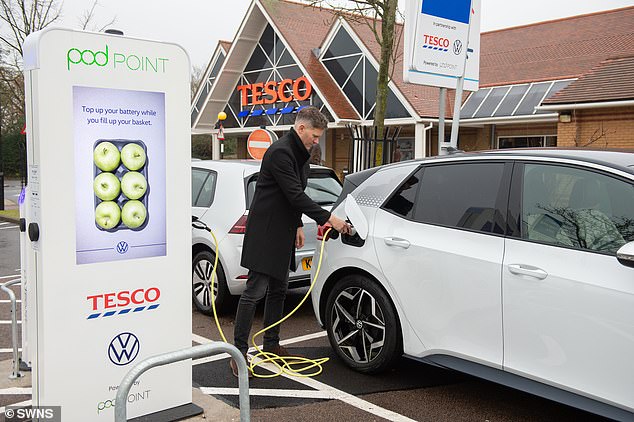Two in five supermarket electric car chargers found not to be working
>
A new survey of the reliability of the electric car charging network at supermarkets found that 43% are not working. Half of the Morrisons chargers were faulty
Shoppers looking to charge their electric vehicles while doing their weekly shopping may be frustrated, as new research has found that more than two in five devices in supermarket parking garages are out of order.
Analysis of public charging data found that 43 percent of chargers at major supermarkets have connection issues or don’t work at all.
The study, conducted by car leasing comparison site LeaseLoco, found that half of the chargers in the Tesco and Morrisons stores surveyed did not work, while two in five at Lidl showed a malfunction.
The analysis was conducted using the Zap-Map charging point app to view the status of devices on the premises of seven major supermarkets on January 14 and 15.
The supermarket chains surveyed were Aldi, Asda, Lidl, Morrisons, Sainsbury’s, Tesco and Waitrose.
The sample included 20 major UK cities* (excluding London) and only looked at supermarkets within a 20km radius of the city centre.
In the seven supermarkets, where the charging status was live and available on Zap-Map, an average of 57 percent worked without problems.
Morrisons had the most comprehensive charger status data on Zap-Map, but it showed that only half (50 percent) of the chargers were working on the data assessed.
The investigation found that 12 out of 13 EV chargers on site at four Morrisons stores in and around Swansea were shown as faulty on Zap-Map.
While only two of the 12 chargers were working in the four Morrisons stores within a 12-mile radius of Portsmouth, the report found.
Asda had the highest percentage of working EV chargers with 74 percent of all assessed where status data was available on Zap-Map.
While Tesco locations had a lower percentage of working chargers than Morrisons at 49 percent, LeaseLoco says this was based on fewer devices, as online status data was not available for chargers in many cases, which was left out of the study as a result.
Tesco also recently removed free charging for customers.
From 1 November 2022, Pod Point, which manages devices in Tesco car parks in partnership with Volkswagen, said EV drivers would have to pay 28 pence per kWh to use the slowest 7kW devices, 40 pence for 22kW chargers and 50 pence per kWh to connect to its network of 50kW fast charging points.
The comparison website said the lack of a charger reliability status for many of the devices checked will add to frustration for EV owners, as it means it may not be possible to know in advance whether certain chargers will work or not.
For example, in all the Aldi stores examined in this study, there was no live status data.
Commenting on the survey results, John Wilmot, CEO of LeaseLoco, said supermarkets should be an ideal location for charging, with the average person spending nearly an hour in the store while doing their shopping, but reliability issues could pose major challenges for EV owners. headaches looking for batteries as they fill their baskets.

While Tesco sites had a lower rate of working chargers than Morrisons at 49%, LeaseLoco says this is based on fewer devices
“This research shows that pinning your hopes on your local supermarket to top up your car battery can be a frustrating experience,” said John.
It also highlights the challenges of relying on public charging infrastructure – including charging stations at supermarkets – that is not 100 percent reliable and where demand outstrips supply.
“While some car owners don’t use public chargers very often, as they only need their vehicles for short distances and can charge at home, many will need to use the public network to keep their cars on the road.
“As more people switch to electric vehicles, the need for suitable charging infrastructure will increase. And if we want to avoid seeing a repeat of the scenes we experienced over Christmas, with drivers queuing for hours to charge their electric cars, this has to be a priority.”
*cities assessed in the study: Birmingham, Bristol, Brighton, Cambridge, Cardiff, Edinburgh, Exeter, Glasgow, Ipswich, To lead, Leicester, Liverpool, Manchester, Middelburg, Newcastle, Norwich, Nottingham, Plymouth, Portsmouth, Southampton, Swansea
Some links in this article may be affiliate links. If you click on it, we may earn a small commission. That helps us fund This Is Money and use it for free. We do not write articles to promote products. We do not allow any commercial relationship to compromise our editorial independence.
